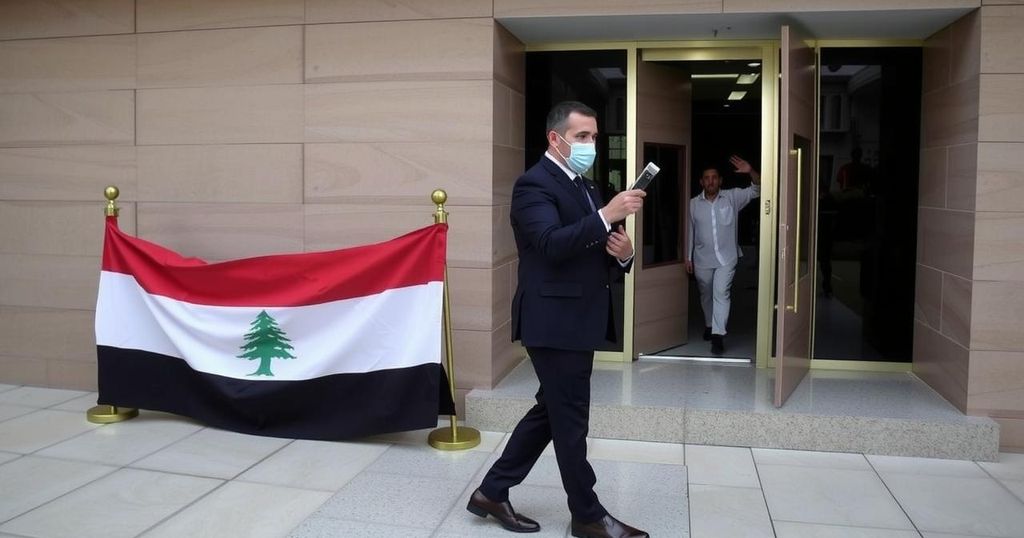Suspension of Syrian Embassy Services in Lebanon Amid Political Shifts

Syria’s embassy in Lebanon has suspended consular services following the arrest of relatives of former President Bashar al-Assad with forged passports. Concurrently, Lebanese authorities have handed over Syrian nationals, including former army officers, to the new government led by HTS. While regional ties are being formed, tensions remain high with pro-Assad factions and among Kurdish populations in northeastern Syria, complicating the political landscape.
BEIRUT (AP) — On Saturday, Syria’s embassy in Lebanon announced the suspension of all consular services following the arrest of two family members of the ousted President Bashar al-Assad at Beirut airport who were reportedly in possession of forged passports. This suspension, directed by the Syrian foreign ministry, was linked to concerns regarding the validity of passports issued at the embassy. Concurrently, Lebanese authorities transferred custody of 70 Syrians, including former Syrian army officers, to the newly established Syrian government led by the group Hayat Tahrir al-Sham (HTS), which was once an insurgent organization.
The decision to suspend consular operations was made public through the embassy’s Facebook page, citing an indefinite halt to services. Security sources indicated that the decision stemmed from concerns over the passports used by Assad’s relatives, specifically the wife and daughter of a cousin of the former president. Reports from the Syrian Observatory for Human Rights revealed that Rifaat Assad, Bashar’s uncle, had reportedly traveled out of the country utilizing his legitimate passport prior to these incidents.
The HTS has been engaging in diplomatic efforts, with regional countries such as Libya and Bahrain sending delegations to Damascus for official discussions. Ahmad al-Sharaa, the leader of HTS, previously known as Abu Mohammed al-Golani, has thus far assuaged fears of repressive measures against communities that supported Assad. Nevertheless, skirmishes between HTS forces and pro-Assad groups have been observed, as well as checkpoints established to search for arms in areas where the Alawite minority resides.
Moreover, in the northeastern part of Syria, tensions continue to escalate between Kurdish-led progression and Turkish-backed forces, creating an atmosphere of unease among local Kurdish populations concerning the emerging political dynamics. The U.S. State Department, represented by Secretary of State Antony Blinken, has emphasized the necessity of a Syrian-led political process that upholds human rights and promotes inclusivity within the new government framework.
In a notable public display, hundreds of Kurdish women rallied in Hasaka, demanding recognition of women’s rights in the changing political landscape. One participant, Perishan Ramadan, expressed concern regarding the new leadership, proclaiming it should be taken seriously as it might represent an ideology even more oppressive than that of Bashar al-Assad.
As the international community closely observes the situation, the outcome of women’s representation and rights within the new Syrian political setup raises pressing questions about the balance of power and societal norms moving forward.
The suspension of consular services at Syria’s embassy in Lebanon comes at a time of escalating tensions following the arrest of relatives of former Syrian President Bashar al-Assad and increased political maneuvers by the newly formed Syrian government, led by the HTS. Amidst concerns regarding security and governance following years of civil conflict, regional dynamics are shifting as various countries seek to establish connections with Syria’s new leadership. The situation is compounded by ongoing conflicts in Kurdish regions and highlights the challenges of establishing a new political order that is inclusive and representative of all citizens, particularly vulnerable groups such as women.
In conclusion, the suspension of Syria’s embassy services in Lebanon signifies a significant shift within the diplomatic landscape in the context of Syrian governance. The arrest of Assad’s relatives and the subsequent handover of former military personnel underline the complex security dynamics in the region. As Syrian leadership seeks to normalize relations with neighboring countries, pressing social issues, particularly the rights of women amidst emerging governance structures, remain at the forefront of public discourse and activism.
Original Source: apnews.com








